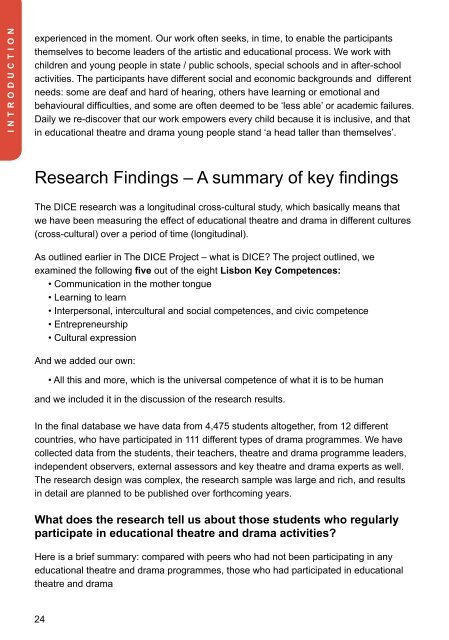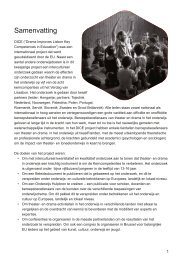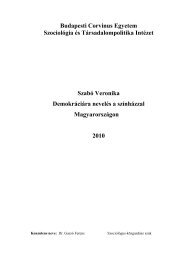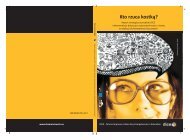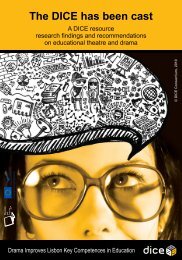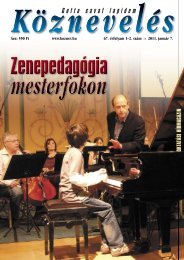Education Resource - Drama Improves Lisbon Key Competences in ...
Education Resource - Drama Improves Lisbon Key Competences in ...
Education Resource - Drama Improves Lisbon Key Competences in ...
- No tags were found...
You also want an ePaper? Increase the reach of your titles
YUMPU automatically turns print PDFs into web optimized ePapers that Google loves.
Introductionexperienced <strong>in</strong> the moment. Our work often seeks, <strong>in</strong> time, to enable the participantsthemselves to become leaders of the artistic and educational process. We work withchildren and young people <strong>in</strong> state / public schools, special schools and <strong>in</strong> after-schoolactivities. The participants have different social and economic backgrounds and differentneeds: some are deaf and hard of hear<strong>in</strong>g, others have learn<strong>in</strong>g or emotional andbehavioural difficulties, and some are often deemed to be ‘less able’ or academic failures.Daily we re-discover that our work empowers every child because it is <strong>in</strong>clusive, and that<strong>in</strong> educational theatre and drama young people stand ‘a head taller than themselves’.Research F<strong>in</strong>d<strong>in</strong>gs – A summary of key f<strong>in</strong>d<strong>in</strong>gsThe DICE research was a longitud<strong>in</strong>al cross-cultural study, which basically means thatwe have been measur<strong>in</strong>g the effect of educational theatre and drama <strong>in</strong> different cultures(cross-cultural) over a period of time (longitud<strong>in</strong>al).As outl<strong>in</strong>ed earlier <strong>in</strong> The DICE Project – what is DICE? The project outl<strong>in</strong>ed, weexam<strong>in</strong>ed the follow<strong>in</strong>g five out of the eight <strong>Lisbon</strong> <strong>Key</strong> <strong>Competences</strong>:• Communication <strong>in</strong> the mother tongue• Learn<strong>in</strong>g to learn• Interpersonal, <strong>in</strong>tercultural and social competences, and civic competence• Entrepreneurship• Cultural expressionAnd we added our own:• All this and more, which is the universal competence of what it is to be humanand we <strong>in</strong>cluded it <strong>in</strong> the discussion of the research results.In the f<strong>in</strong>al database we have data from 4,475 students altogether, from 12 differentcountries, who have participated <strong>in</strong> 111 different types of drama programmes. We havecollected data from the students, their teachers, theatre and drama programme leaders,<strong>in</strong>dependent observers, external assessors and key theatre and drama experts as well.The research design was complex, the research sample was large and rich, and results<strong>in</strong> detail are planned to be published over forthcom<strong>in</strong>g years.What does the research tell us about those students who regularlyparticipate <strong>in</strong> educational theatre and drama activities?• are assessed more highly by their teachers<strong>in</strong> all aspects,• feel more confident <strong>in</strong> read<strong>in</strong>g andunderstand<strong>in</strong>g tasks,• feel more confident <strong>in</strong> communication,• are more likely to feel that they arecreative,• like go<strong>in</strong>g to school more,• enjoy school activities more,• are better at problem solv<strong>in</strong>g,• are better at cop<strong>in</strong>g with stress,• are significantly more toleranttowards both m<strong>in</strong>orities and foreigners,• are more active citizens,• show more <strong>in</strong>terest <strong>in</strong> vot<strong>in</strong>g at any level,• have more <strong>in</strong>terest <strong>in</strong> participat<strong>in</strong>g <strong>in</strong> public issues,• are more empathic: they have concern for others,• are more able to change their perspective,• are more <strong>in</strong>novative and entrepreneurial,• show more dedication towards their future and have more plans,• are much more will<strong>in</strong>g to participate <strong>in</strong> any genre of arts and culture, and not justperform<strong>in</strong>g arts, but also writ<strong>in</strong>g, mak<strong>in</strong>g music, films, handicrafts, and attend<strong>in</strong>g allsorts of arts and cultural activities,• spend more time <strong>in</strong> school, more time read<strong>in</strong>g, do<strong>in</strong>g housework, play<strong>in</strong>g, talk<strong>in</strong>g,spend<strong>in</strong>g time with family members and tak<strong>in</strong>g care of younger brothers and sisters.In contrast, they spend less time with watch<strong>in</strong>g TV or play<strong>in</strong>g computer games,• do more for their families, are more likely to have a part-time job and spend moretime be<strong>in</strong>g creative either alone or <strong>in</strong> a group. They go more frequently to thetheatre, exhibitions and museums, and the c<strong>in</strong>ema, and go hik<strong>in</strong>g and bik<strong>in</strong>g moreoften,• are more likely to be a central character <strong>in</strong> the class,• have a better sense of humour,• feel better at home.Section B of this book <strong>in</strong>cludes short extracts about the most relevant results related toeach of the key competences. If you would like to know more details about the researchmethodology and the results, read Section B of this book’s tw<strong>in</strong>: “The DICE has beencast – research f<strong>in</strong>d<strong>in</strong>gs and recommendations on educational theatre and drama”.IntroductionHere is a brief summary: compared with peers who had not been participat<strong>in</strong>g <strong>in</strong> anyeducational theatre and drama programmes, those who had participated <strong>in</strong> educationaltheatre and drama2425


